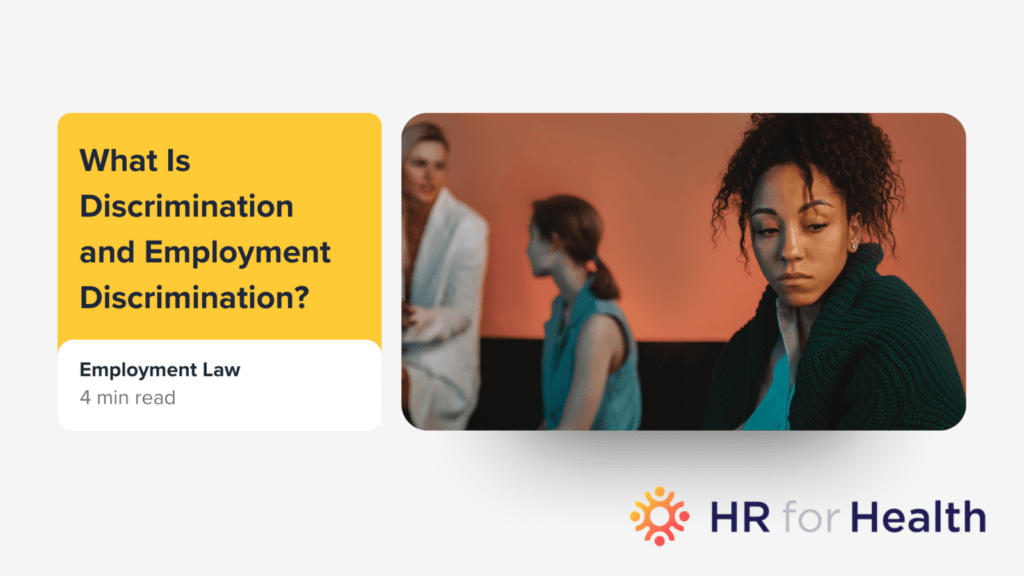UPDATED 05/04/2023
If you have a medical practice, you must understand employment discrimination laws and how they apply to your office. This knowledge can provide legal protection.
Imagine an administrative assistant at your medical practice suddenly quits, and you quickly need to find a replacement you can trust to stick around for the long haul. You interview several candidates and pass on a particular applicant because she must take maternity leave within three months. Did you know that this could make you liable for employment discrimination?
Discrimination comes in many forms. It can even mean entirely different things in the outside world and your practice. If you fail to recognize these differences in your dental practice office, you could be liable to lawsuits and other legal consequences. Review the following information to protect yourself and everyone in your practice.
Discrimination vs. Employment Discrimination
When someone faces discriminatory behavior, they’re being treated differently for some reason. Whether this occurs in a chiropractic office or on the baseball field, there can be severe consequences. With employment discrimination, though, federal rules are in place that businesses must comply with.
The Equal Employment Opportunity Commission (EEOC) outlines specific rules to protect individuals in your practice. Both employees and non-employees can face discrimination in your practice. For instance, refusing to hire someone in a physical therapy office because you think their age will make them less effective could violate the EEOC rules against age discrimination.
The EEOC defends against discrimination in the following forms:
• Unfair treatment related to protected statuses such as race, national origin, age, and other classes.
• Harassment by coworkers, owners, managers, and others in your practice related to protected statuses.
• Refusing to offer reasonable accommodations linked to a person’s disability or religious beliefs.
• Asking specific questions or asking for disclosure of medical or genetic information.
• Retaliating against an individual who complained about discrimination or took part in proceedings focused on employment discrimination.
There are many protected statuses under the EEOC. These include religion, age, sex (gender identity, sexual orientation, and pregnancy), national origin, genetic and medical information, race, color, and disability. These rules can sometimes be complex. Firing someone for illness during the coronavirus pandemic, for instance, may instead fall under the FFCRA.
Consequences of Employment Discrimination
For your medical practice to require EEOC oversight, it must typically have at least 15 employees. For instance, a physical therapist who only employs an assistant will likely not be under the purview of these federal guidelines. However, things can become challenging for a healthcare practice once someone files a valid discrimination claim.
An investigation will take place once someone files a claim. If it’s discovered that the employer engaged in employment discrimination, the following are a few of the potential consequences:
• Mediation: Employers could avoid EEOC investigations by handling complaints through mediation.
• Employee lawsuit: Regardless of any EEOC findings, an employer who feels discriminated against can still file a lawsuit.
• EEOC lawsuit: The EEOC can sue at the behest of an individual if they feel employment discrimination has occurred.
• Worker relief: If discrimination occurs, the EEOC can require an employer to reinstate an individual, promote them, or pay back wages. Specific remedies will depend on the situation.
• Legal and court costs: The EEOC may require employers to reimburse individuals for court or legal costs.
• Punitive damages: Courts may hand down punitive judgments in addition to compensatory damages. This amount could reach up to $300,000 per defendant.
These rules have some nuances — such as capping damages for age and sex discrimination — but the outcome is never positive when employment discrimination occurs in a healthcare office. Not only are the costs potentially devastating, but such a complaint could also ruin the reputation of an office.
Medical practices should also note that the specifics of EEOC rules can change. This is often due to political issues — as we recently saw with the party-line vote to provide updated religious protections. Your healthcare office must do more than learn the rules; they must also stay abreast of sudden changes.
How HR For Health Can Help
Discrimination is improper, regardless of whether it occurs within or outside the workplace. The consequences could bankrupt your office if it takes place inside your medical practice. This is why you must understand employment discrimination or use human resource professionals who know the nuance of the law. Contact HR For Health today to learn more.



